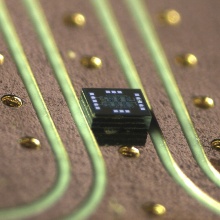Open student theses
Motivation:
A novel FMCW radar principle operates without an explicit local oscillator signal in the receiver, but relies on self-mixing of the receiver.
Goals:
Developement of digitally controllable generation of large bandwidth (> 10GHz) frequency ramps.
Tasks:
a.o.:
- Evaluation of frequency ramp generation possibilities
- Design, simulation layout of RF-PCB
- Programming
- Setup, measurement and characterization
Please refer to PDF for more details.
Motivation:
A novel FMCW radar principle operates without an explicit local oscillator signal in the receiver, but relies on self-mixing of the receiver.
Goals:
Developement of a self-mixing radar frontend with transmitter and novel receiver, using E-Band MMIC from ILH
Tasks:
a.o.:
- System Level simulation
- EM-Simulation
- Design, simulation, layout and assembly of a RF-PCB
- Setup, measurement and characterization
- Verification
Please refer to PDF for more details.
Motivation:
A novel FMCW radar principle operates without an explicit local oscillator signal in the receiver, but relies on self-mixing of the receiver.
Goals:
Developement of digital signal processing (DSP) for a self-mixing radar based on FPGA should be developed, aiming at embedding the DSP in a handheld radar demonstrator platform.
Possible Tasks:
a.o.:
- Programming of FPGA and implement DSP
- Debugging and characterization with generic and real-life radar data
- Design of an interface / data display for demonstration purposes
- Examine possibilities to embed the FPGA-based DSP in a handheld radar demonstrator platform
Please refer to PDF for more details.
Motivation:
The stability of terahertz analog circuits is highly dependent on the quality of the DC supply. MMICs usually require several different DC levels for operation, which are typically very sensitive to the injection of noise.
Goals:
A DC supply for MMIC must be developed, featuring
- low noise at all outputs
- four-quadrant operation for low power channels
- two-quadrant operation for high power channels
- programmable voltage, current limit and ramp-up and ramp-down sequences
Your Tasks:
- Design, simulation, layout and assembly of the PCB
- Programming and debugging
- Setup, measurement and characterization
Please refer to PDF for more details.
Motivation:
A novel FMCW radar principle operates without an explicit local oscillator signal in the receiver, but relies on self-mixing of the receiver.
Goals:
Developement of analog circuit components in a 350GHz/500GHz f_T/f_max SiGe process.
Tasks:
a.o.:
- SoA investigation
- Design and Simulation of selected analog circuits
- MMIC layout and verification with Cadence/Keysight ADS etc.
Please refer to PDF for more details.
Motivation:
For a novel self-mixing FMCW radar Demonstrator (MIRADOR) a custom made power supply will enable to operate the demonstrator without the use of external low noise power supply.
Goals:
Based on an existing platform using STM32 µController with ADC and DAC, Op-Amps and
LDO´s a custom PCB for the supply of total of four MMIC on a E-Band Radar frontend must be
designed.
Your Tasks:
a.o.:
- Design and Layout of a custom PCB
- Setup and test
- Programming of ramping sequences
Please refer to PDF for more details.
Contact

Dominik Koch
M.Sc.Group Leader Power Electronics / Research Assistant

Benjamin Schoch
M.Sc.Research Assistant


